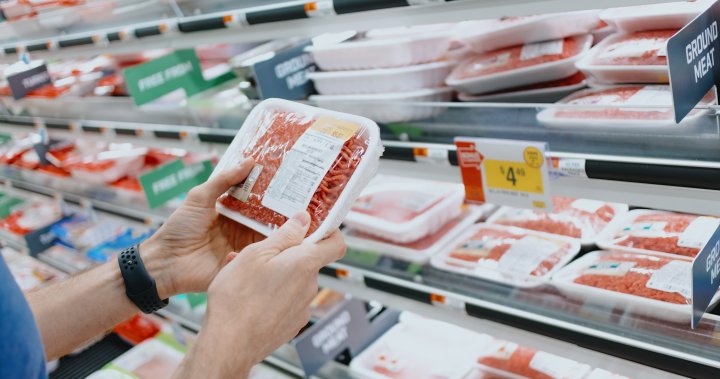The number of complaints about grocery weight labelling filed to Canada’s food regulatory authority has gone up in the past three years, data shows, as frustration over the cost of living continues to run high across the country.
The Canadian Food Inspection Agency received 89 complaints related to “net quantity concerns” from May 1, 2023 to April 30, 2024, according to statistics the agency shared with Global News on Thursday.
That represents a 140 per cent jump — or more than a two-fold increase — compared with the previous 12 months, when 37 complaints of this nature were reported between May 1, 2022 and April 30, 2023.
In comparison, there were 22 complaints filed to the CFIA from May 1, 2021 to April 30, 2022. The 12 months prior to that saw 42 complaints.
But in the past month alone, there have been eight complaints of net quantity, CFIA data showed.
The agency has a webpage that allows people to submit any food-related complaints or concerns by filling out a form.
“The CFIA takes these issues seriously and wants to know about products that consumers think are labelled as misleading,” a spokesperson for the agency said in an emailed statement to Global News.

Canadians have increasingly been calling out on social media apparent weight discrepancies in food product labelling, with videos circulating of people weighing their food packages and finding far less than what’s on the label.
Financial news and insights
delivered to your email every Saturday.
This comes as a nationwide boycott of Loblaw has gathered steam online over the past month as Canadians grow concerned about high grocery bills, though it’s not clear where consumers bought the items with apparent weight discrepancies.
Under the Safe Food for Canadians Act, it is prohibited to “manufacture, prepare, package, label, sell, import or advertise a food commodity in a manner that is false, misleading or deceptive or is likely to create an erroneous impression.”
The Food and Drugs Act also bars labelling, packaging, selling or advertising food in a false, misleading or deceptive way.

According to the CFIA spokesperson, it is the responsibility of the manufacturer to meet all applicable safety and labelling requirements for a food, including declaring the net quantity when it is required.
“It is mandatory that the net quantity on the label accurately reflects the contents of the package, and that the labelled weight does not include the packaging itself so the net quantity must reflect only the net quantity of the food,” the spokesperson said.
When a consumer complaint is lodged to the CFIA, it responds by doing any required inspection.
When non-compliance is found, the CFIA takes “appropriate action,” including notifying the manufacturer or importer, requesting corrective actions, conducting additional inspections, doing further targeted sampling, seizing products and requesting food recalls.
The CFIA may also impose fines and issue notifications to the public about charges it has laid.
“In addition to responding to consumer complaints, the CFIA also does regular inspections to verify that businesses are meeting their labelling requirements,” the spokesperson said.
© 2024 Global News, a division of Corus Entertainment Inc.





